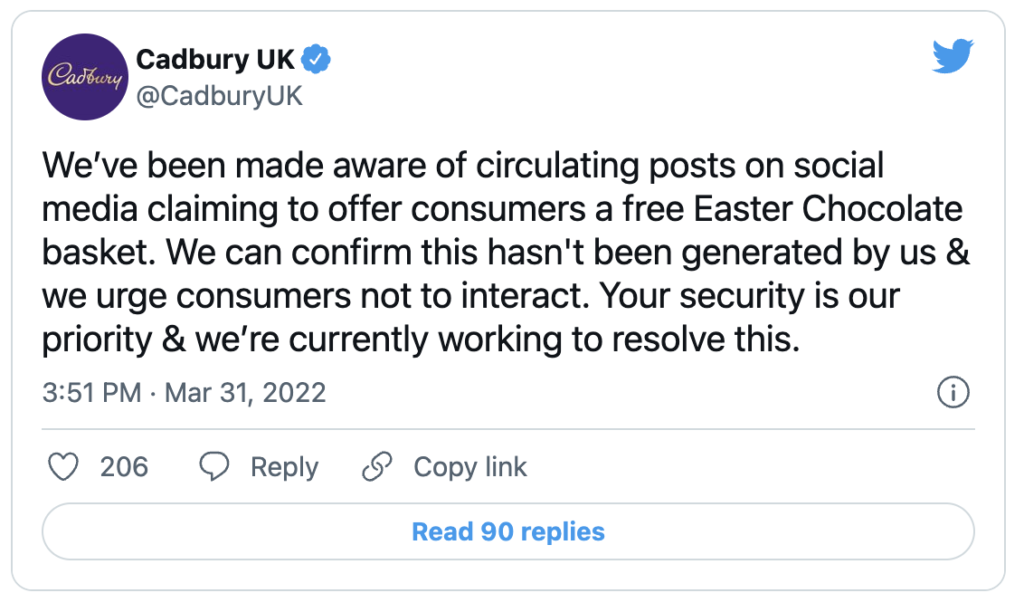Easter may be one of the last days you’d expect cyber attacks, but it’s always best to be prepared. Cyberattackers will strike at any time, especially on holidays. With this in mind, it’s very prudent to be on the lookout for potentially malicious holiday-themed communication.
In recent news confectionery giant Cadbury has warned its customers of a scam circulating on WhatsApp that offers consumers a free Easter chocolate basket.
Recipients of the message have posted images online showing an offer to claim a free Easter egg basket with a link attached.
However, Cadbury has confirmed the offer is “not genuine” and has stated that it is working to resolve the issue.
A tweet posted to the Cadbury UK Twitter account on 31 March read: “We’ve been made aware of circulating posts on social media claiming to offer consumers a free Easter Chocolate basket.”
“We can confirm this hasn’t been generated by us & we urge consumers not to interact. Your security is our priority & we’re currently working to resolve this.”
The scam appears to be a phishing scam where criminals create messages that appear genuine in order to get a customer to click on the link to a fake website and input their details or see viruses installed on their device.”
Scams like this play on your fear of missing out by displaying how many of the free items are left in order to make you jump through those hoops more quickly and – hopefully – not read too carefully what you might be signing up for.
The scammers want your name, address and potentially other personal details – information you would assume is required to send you the chocolate – but then use those details to try and steal your identity and your money.


With cyberattacks increasingly sophisticated and forever on the rise, this illustrates the importance of cyber security education.
Calendar events provide the perfect disguise for cyber and as the Easter holiday approaches it pays to be aware of potential holiday scams and cyber campaigns. These can include:
Emails from unknown senders that may contain malicious links. These emails might offer holiday bargains, Easter sale discounts and other Easter related offers.
Fake advertisements on websites that may take you through to infected web pages.
Fake posts on social networking sites requesting support for fraudulent causes or offering savings on holiday breaks.
Ecards wishing you a Happy Easter from unknown senders.
Phishing emails are the most common form of fraud. They use email or malicious websites to solicit personal information by posing as a trustworthy organisation.
Examine the email message closely- look for obvious signs of fraud such as poor spelling, unprofessional imagery and bad grammar. If the message contains a phone number do an Internet search for the number to verify its legitimacy.
Be wary of unsolicited attachments, even from people you know. An email message may look like it came from someone and organisation but it may not be genuine. The thing to watch out for is unexpected attachments.`
Trust your instincts. If an email or email attachment seems suspicious, don’t open it. At the very least, contact the person who supposedly sent the message to make sure it’s legitimate before you open the attachment.
This information was taken form The Independent, bullguard.com and techadvisor.com.
